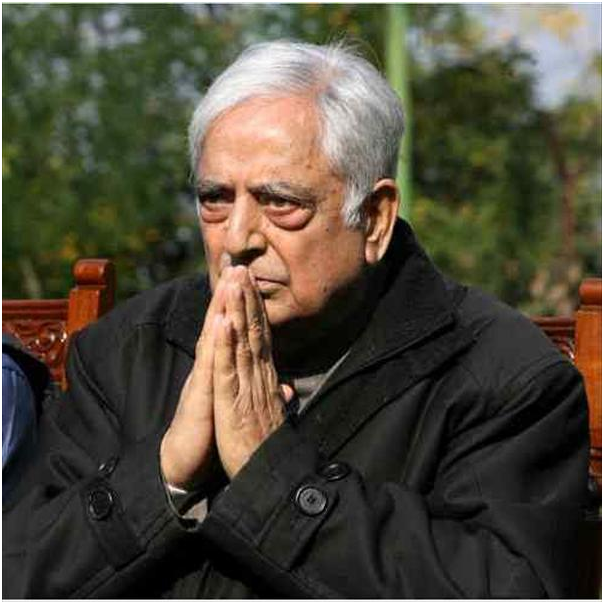MUFTI MOHAMMAD SAYEED DECODED
Mufti Mohammad Sayeed: final touches on government with BJP

NEW DELHI: The RSS might have doubts, so probably has the Bharatiya Janata party but from all accounts Peoples Democratic Party leader Mufti Mohammad Sayeed is clear that a coalition government with the BJP in Jammu and Kashmir is an “historic opportunity” that he is not really willing to let go.
Nor for that matter are Prime Minister Narendra Modi and BJP President Amit Shah who have been working on a compromise formula with Mufti for now almost two months without a final breakthrough. Every single day ‘sources’ tell one or the other Kashmiri reporter that the talks have concluded successfully, and all has been resolved. Only to find the next day reports, again of course quoting ‘sources’ of a sticking point in the dialogue that wavers between Article 370 and AFSPA. Latest reports insist it is AFSPA, even though February 23 is being mentioned as the date when both the political parties will announce their decision to form the government.
Mufti has set out a five point agenda that is basically a fig leaf to be worked around, and to ensure that he can persuade the Kashmiris that he is not letting them down. The points include: no abrogation of Article 370, talks with the All Parties Hurriyat Conference, peace talks with Pakistan, repeal of the Armed Forces Special Powers Act and the state’s fair share of the waters under the Indus Waters Treaty.
It is clear from his statements, not that many but sufficient, that there is a pattern and a consistency. Right from the beginning, the Mufti has made cosy with the BJP and while it was essential for both to attack the other during a part of the campaign, they lost little time in making up once the elections were over. And almost immediately went into a huddle for talks that are going on till today, almost two months after the results, to form a coalition government in the state.
Mufti does not want to rush it, does not feel there is any need. He seems determined to form the government with the BJP and unwilling to explore any other alternatives, dismissing alliances with the NC or Congress or both for that matter as unfeasible. He is also, judging from his interviews and statements, not keen for a second election and confident that he will succeed in working out a common meeting ground with the BJP.
To meet these five points the BJP will have to eat crow and while it is possible for it to ignore Article 370 by heeding to the status quo, it will be impossible for it to agree to revoke AFSPA that has been now the demand of the National Conference as well as all sections of society in the Kashmir Valley. The Congress party itself was unable to move forward on this, despite repeated calls by the then National Conference chief minister Omar Abdullah as the elections approached with the Army putting up a stiff resistance. The BJP that has been strident in its support for AFSPA will not be able to agree to this demand that cannot be placed under the carpet, given the position of the Kashmir Valley against it.
Mufti is directly in charge of the PDP talks with the BJP. Muzaffar Baig has been acting on directions from the Mufti and not on his own, despite taking the flak for being the most enthusiastic legislator to form the government with the BJP. Sources said that he is acting under the PDP patrons directions, and not outside these, with the entire party waiting silently for the outcome.Even daughter Mehbooba who is running at his bidding, latest being her meeting with Union Finance Minister Arun Jaitley to work out the details of the compromise formula so that it does not stick in the gullet of either Jammu or Kashmir.
In a most telling comment the Mufti told the Times of India, “Kashmir is a part of the body of India, it's a part that is injured. And I want to help fix that part.That's why I'm here.” Mufti’s interviews have always been important for what is not said, and here in response to a question whether he will join the NDA he said, ‘it is too early to say anything on that.” The fact that he did not rule it out is significant, and clearly the PDP pay off in the coalition could come from ministerial berths in the Union Cabinet.
Equally significant was his comment to a question on the Gujarat violence in 2002 and whether this remained an issue. “ Indian Muslims may have an issue, but they know Mufti has fought for Kashmir, has fought for Kashmir's identity. Judge me by my deeds. I have been home minister of India. Now the Muslims too seek an inclusive government, they also want security. Did riots not happen in Meerut, Maliana under Congress rule? “ he said in yet another clear indication how close he is to the BJP and the current dispensation at the centre.
Mufti is clearly not worried about the reaction of the Kashmiris, more so the youth who have been opposing this PDP-Congress alliance. He sounds increasingly confident that one, the coalition government will come through sooner than later and two, he will be able to make it work now that he has got the BJP to agree to give him the full six years in power. But then while an astute politician, Mufti has never really been recognised as a visionary in politics.
//www.youtube.com/embed/YQmGQUaLo1U



